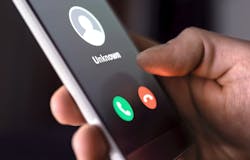Utility Scams Proliferate During COVID-19 Outbreak
Scammers are becoming especially active in the wake of the COVID-19 outbreak, leaving utility companies and consumer watchdogs scrambling to catch up.
The Washington, D.C.-area Office of the People’s Council (OPC) issued a warning that utility scammers are active during the coronavirus crisis.
“These scams may come via phone, email, regular mail or even in person, and the scammer may threaten disconnection if there is no payment. Some scam calls even show up on your caller ID as if a utility is calling,”
Most institutions trying to get the word out are spreading the warning that utilities will not disconnect power without first contacting customers, and besides that, many utilities have discontinued their cut-offs for late payment since the outbreak began.
The OPC, for instance, said that in the D.C. area, Pepco, Washington Gas, DC Water and Verizon Washington are waiving late fees in addition to suspending disconnections.
The Omaha Public Power District (OPPD) said its customers are reporting getting calls from scammers claiming to represent a utility company.
“Callers falsely claim to work for the utility and try to get customers to pay money that they do not really owe. They threaten to disconnect service soon if customers don’t comply,” according to a blog post from OPPD.
One telltale sign, according to OPPD, is that scammers will demand payment in pre-paid gift cards or gift certificates.
“The more sophisticated scammers spoof a utility’s real phone number so they appear authentic on the caller ID,” said Nitin Gambhir, supervisor of Customer Care services for OPPD. “Some even record utilities’ actual customer service messages so that when customers call back, they hear the same voice and menu they would hear if they called the utility.”
The problem is so severe even before the COVID-19 outbreak that the utility industry formed its own group called Utilities United Against Scams (UUAS), a consortium of more than 140 electric, water, and natural gas utilities working together to combat scams.
The UUAS announced as early as Wednesday that it was receiving reports of people impersonating government officials and threatening service interruptions. The UUAS says utilities will always contact people directly rather than sending someone else, and instructed consumers to report scams to utilities.
Indianapolis Power & Light (IPL), a unit of AES Corp., worked with media outlets and the Indiana Attorney General’s Office to stop the efforts of scammers and impersonators.
“The unprecedented coronavirus pandemic has undoubtedly left many Hoosiers feeling worried, scared or uncertain about the world around them,” Attorney General Curtis Hill said in a statement. “Scammers capitalize on challenging times like this to prey on innocent consumers. Falling victim to a scam during this pandemic could have irreversible consequences.”
In this case, officials reported that the scammers told customers if they did not pay within 30 minutes, their electricity would be disconnected. IPL responded by telling the public that it is suspending all electricity shut-offs through April 15.
For more information about which utilities have suspended shut-offs and which have not, please read this story.
About the Author
Jeff Postelwait
Managing Editor
Jeff Postelwait is a writer and editor with a background in newspapers and online editing who has been writing about the electric utility industry since 2008. Jeff is senior editor for T&D World magazine and sits on the advisory board of the T&D World Conference and Exhibition. Utility Products, Power Engineering, Powergrid International and Electric Light & Power are some of the other publications in which Jeff's work has been featured. Jeff received his degree in journalism news editing from Oklahoma State University and currently operates out of Oregon.
